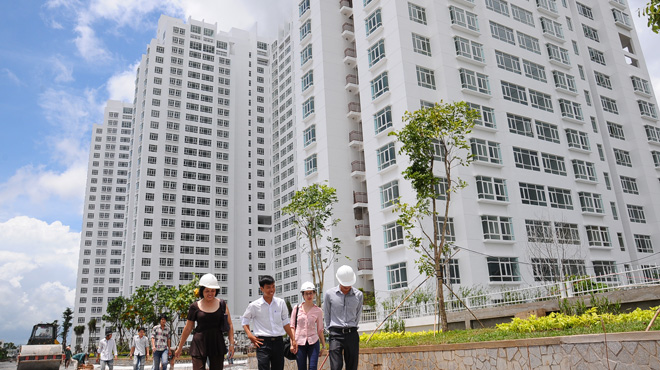The overheating realty market in recent years resulted in unreasonably high real estate prices, but are now falling given the fact that housing demand is still low, said a senior state official in a recent TV program.
When asked for his forecast for the local real estate market at the end of 2013 and the coming year, Construction Minister Trinh Dinh Dung said that there have been some positive movements with increasing transactions, especially in the low-cost residential segment with medium and small-scale apartments, after a long period of “hibernation.”
We have seen some shortage in supply, he said on the TV program aired by the national broadcaster Vietnam Television.
But, in general, the market is still struggling given the current macroeconomic picture, he said.
Property prices have fallen sharply, approaching real value, while realty investors have to cut their offering price in order to increase transactions.
But the situation will gradually get better as more and more people will be financially capable of buying a house given the recent drop in housing prices.
The interviewer asked the minister for an insight into the fact that it is hard for normal people to gain access to the VND30 trillion package meant to assist homebuyers, thus resulting in slow disbursement of the whole package.
“Some people said they were very happy when the government introduced the package which will enable them to have decent accommodations. However, their hopes are dwindling day by day given complicated disbursement procedures,” said the interviewer.
Only 1.1 percent, or VND341 billion, of the package has been disbursed to people in need, despite being available for 6 months already.
The VND30 trillion package is a governmental policy supporting low-income people to improve their housing conditions, Dung said.
The main problem is that the package can only be disbursed quickly if there are enough apartments that meet its criteria. The floor area must be within 70 square meters and worth VND15 million per m2 at most, he said.
The country now needs more than a million of these social housing units, he added.
However, the core of this problem cannot be solved quickly because the social housing strategy has just been implemented, while the development of such social housing projects will take years to take shape.
The second problem is that many realty developers are reluctant to invest in social housing due to lower profit margins than those of commercial housing development.
The third issue is that the procedure required to disburse to those who want to borrow from the VND30 trillion package is mandatory. “If we loosen it, it will easily lead to wrongdoings, and the money will not go to those who really need it, which, in turn, will cause losses to the state budget.”


















































